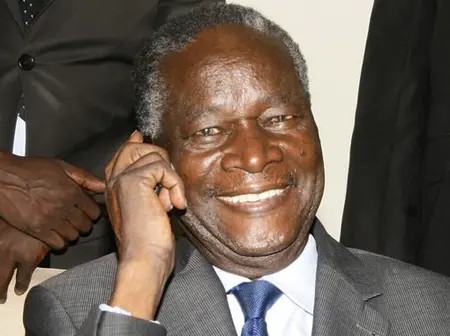Nicholas Kipyator Kiprono Biwott was more than just a politician—he was one of the most enigmatic and feared figures in Kenya’s political history. Known widely as “The Total Man,” Biwott’s career spanned decades, during which he wielded immense influence, inspired loyalty, and instilled fear in equal measure. His life was a complex blend of political mastery, controversy, secrecy, and philanthropy.
This article delves deep into the man behind the myth, exploring who Nicholas Biwott was, why Kenyans feared him, his extensive political and business empire, the connection to the Robert Ouko murder, and the legacy he left behind.
Nicholas Biwott was born in 1940 in Keiyo, Elgeyo-Marakwet County, Kenya. He rose from humble beginnings, pursuing his education with determination. He studied at the University of Melbourne in Australia, earning degrees in economics and commerce—skills that would later shape his political and business acumen.
His political career began in the 1970s when he was appointed District Commissioner, a role that gave him his first taste of power. His close relationship with President Daniel Arap Moi would soon transform him into one of the most influential men in Kenya.
Biwott became a central figure during President Moi’s rule from 1978 to 2002. Holding key cabinet positions—particularly in the Ministries of Energy and Tourism—he controlled strategic sectors like oil, power, and infrastructure.
The nickname “The Total Man” emerged due to his unmatched political maneuvering, ability to influence decisions at the highest level, and his reputation for getting things done—whether through persuasion, intimidation, or force.
Biwott’s influence extended beyond the public eye. Many politicians and business leaders saw him as the de facto deputy to Moi, even though he never officially held the vice presidency.
One of Biwott’s most powerful roles was as Minister of Energy. He oversaw Kenya’s oil imports and pricing, which gave him enormous leverage over the economy. Critics accused him of using this position to build a vast fortune through offshore accounts, kickbacks, and strategic business deals.
Reports claimed that Biwott held investments in real estate, hotels, and agriculture, both locally and abroad. His control over infrastructure projects allowed him to channel influence into almost every sector of Kenyan life.
Biwott’s reputation was built on more than political power—it was reinforced by secrecy and an aura of paranoia.
He was known to change vehicles multiple times a day to avoid surveillance. Meetings were held in unusual locations, and he often moved without a predictable schedule. Associates described him as a master of political survival, adept at silencing critics and neutralizing rivals.
For many, the mere mention of Nicholas Biwott’s name brought unease. In political circles, it was widely believed that crossing him could end careers or worse.
Perhaps the darkest shadow over Biwott’s career was his alleged involvement in the 1990 murder of Foreign Affairs Minister Dr. Robert Ouko.
British detective John Troon of Scotland Yard named Biwott a “person of interest” in the case, citing witness statements and political tensions between the two men. One affidavit alleged that Biwott had threatened Ouko during an official trip to the United States, warning him of severe consequences.
Biwott consistently denied any involvement, and no court ever found him guilty. Nevertheless, the incident cemented his feared image in the public imagination. A Kenyan parliamentary inquiry into Ouko’s death collapsed amid political interference, further deepening suspicions.
Despite the controversies, Biwott was also recognized for his philanthropic contributions. Through the Mbegu Trust, he funded schools, hospitals, and water projects in marginalized areas.
He sponsored students’ education, supported healthcare initiatives, and invested in community development. For many in his rural constituency, he was a benefactor whose influence brought tangible improvements to their lives.
Nicholas Biwott’s public image was deeply divided. To his supporters, he was a visionary leader who delivered development and defended the interests of his people. To his detractors, he was a symbol of unchecked power, political intimidation, and corruption.
His ability to remain relevant through successive political eras, despite scandals and shifting alliances, speaks to his skill as a political operator.
Nicholas Biwott died on July 11, 2017, at the age of 77. His death reignited public debate about his life, legacy, and the secrets he took to his grave.
Many questions remain unanswered: What was his exact role in shaping Moi’s government? How much wealth did he truly control? And what were the real facts behind the Ouko murder case?
Nicholas Biwott’s legacy is one of contradiction. He was a nation-builder and a feared enforcer, a philanthropist and a political hardliner, a man who lived in both the spotlight and the shadows.
The “Total Man” may be gone, but his story continues to intrigue, inspire, and caution future generations about the complexities of political power in Kenya.
Final ThoughtsThe life of Nicholas Biwott offers a glimpse into Kenya’s political past, where loyalty, power, and fear intertwined to shape the country’s destiny. Whether remembered as a hero, a villain, or both, one thing remains certain: Biwott was a man whose name will never be forgotten.

Leave a Reply